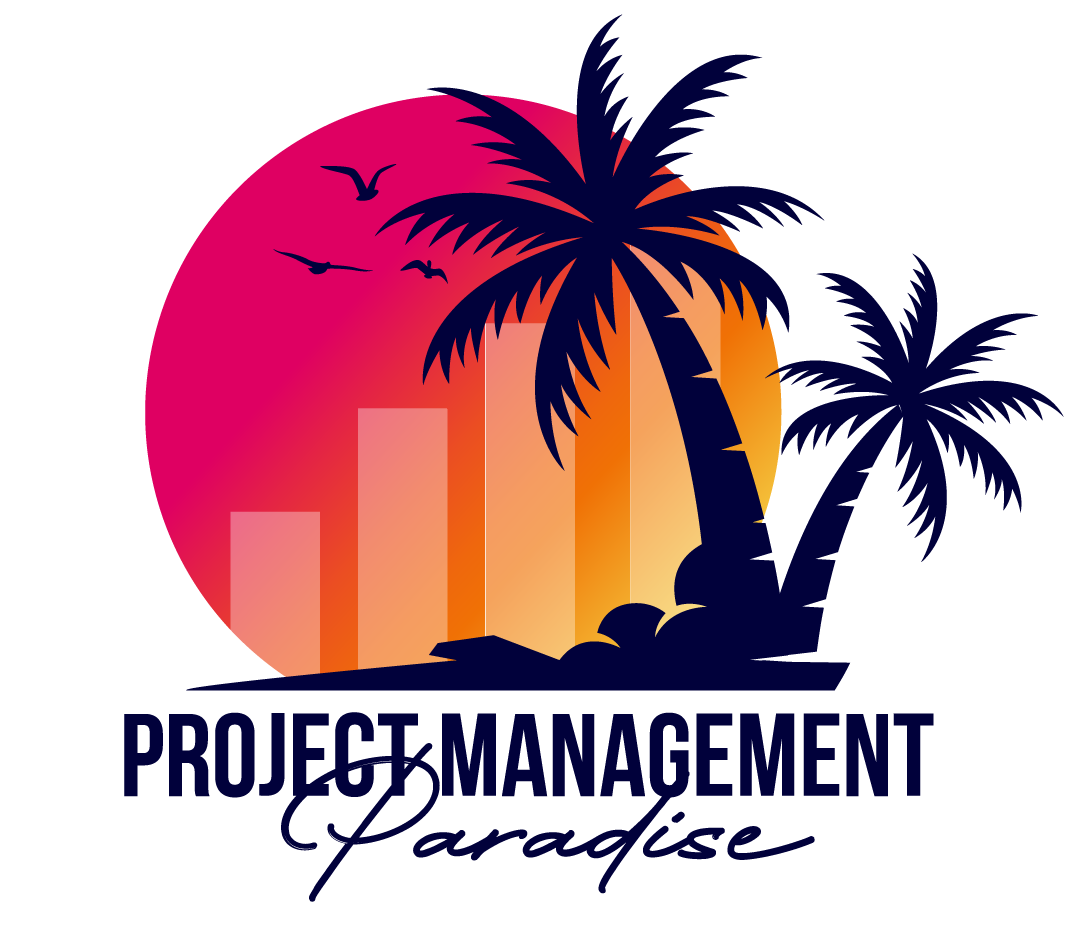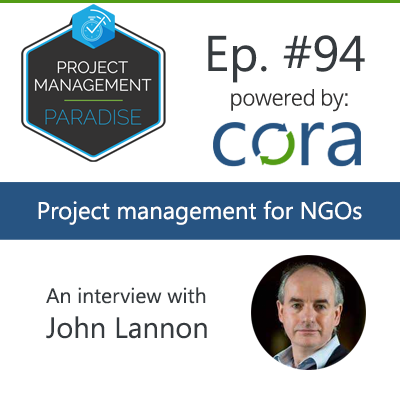In this episode of the Project Management Paradise Podcast Caitríona discusses Project Management for NGOs with Dr. John Lannon, a lecturer at the Center for Project Management in the University of Limerick.
John’s research is primarily focused in the field of international development, human rights promotion and protection, and humanitarian assistance. He has worked on some fascinating projects with international non-governmental organizations around the world. As well as discussing Project Management for NGOs Caitríona speaks to John about working in challenging areas such as child trafficking, in often very volatile political and social environments.
The podcast is sponsored by Cora Systems providers of enterprise project and portfolio management solutions and services to government agencies and large-scale global organizations. To see how Cora can help transform your organization why not request a free personalized Demo.
Subscribe to Project Management Paradise via one of the links above or on the right and you’ll automatically receive new episodes directly to your device.
Excerpts from Episode 94: “Project Management for NGOs” with Dr. John Lannon
Could you tell us a little about your background?
 Several decades ago, I got a degree in electronic engineering but ended up working in software systems design and development in the corporate sector for many years, around 15 years or so. I am mostly in technical roles where I was switched in and out of project management as I went along.
Several decades ago, I got a degree in electronic engineering but ended up working in software systems design and development in the corporate sector for many years, around 15 years or so. I am mostly in technical roles where I was switched in and out of project management as I went along.
At the start of the last decade, I went back to do a master’s degree and moved into academia, part-time at first. But it was also involved in consultancy work for a few years. Proceeded on to do a Ph.D. which essentially brought together some of my interests in human rights work. In particular what some international, what some non-governmental organizations were doing, that brought back together with my technical background into the Human Rights Movement. That really was the first point of contact with NGOs in terms of working with them.
I continued then over the last 15 years or so to do consultancy work with the number of NGOs around Europe and Ireland. About 5 years ago, located myself here at the Centre of Project Management at the University of Limerick, so here I am now.
Could you maybe give us an example of some of the projects that you’ve worked on?
Yeah, so I’ve worked on a number of projects, as I said, in consultancy roles in organizations in Ireland, Switzerland, and Holland, and various other places. One of the projects I worked on, as part of my Ph.D., was actually the action research initiative in Armenia.
I was using a framework there that I had developed for assessing the effectiveness and the impact of capacity-building initiatives with local NGOs. I’ve also worked with people in Rhodes University in South Africa where I lived for a while on ICT for development projects and specifically looking at digital citizen engagement initiatives that are intended to enable civil society and government officials to communicate more effectively on around service delivery for example of water sanitation.
And other ones that involve child trafficking was with the NGO plan international when I worked on the feasibility study for a technology-based system to help combat cross-border child trafficking in South Asia. Children are being trafficked across the border from places like Nepal and Bangladesh into India, girls going into the sex trade, boys to the Middle East to be operators, camel jockeys, going into bonded labor.
I did a feasibility study into developing the system to connect the various government bodies and an NGOs and agencies so that they could work more effectively around to the rescue, the rehabilitation, repatriation of trafficked children. One of the things just to note in terms of that project was that the big challenges were the social, the economic and the political rather than the technological. That was the key aspect of that project.
Coming from the western world into a working with both the local NGOs and government organizations, could you tell us about cultural challenges and differences along the way, and how you overcame them?
When working in what we call the international development sector and with projects and programs there is a whole range of challenges. First of all, there’s generally a whole multiplicity of actors with very different perspective. There are competing demands, unreliable funding streams in many cases, you are often working in volatile political or social environments and there is a lack of resources often, as well.
I guess another difficulty might often be coming from a western perspective and project team members may have limited exposure to the project management and reporting tools that are favored by the donors. I’ve mentioned around the different perspectives and competing demands but very often the economic or the efficiency, set rationality in the project management might not fit very well with the perspectives or the values of the local project team members.
We are good in terms of understanding how project management provides a sort of a disciplined approach to projects and can help make better use of the limited resources so on and so forth. But I remember us going back now if I stay over 20 years talked about the tyranny of the project in international development and how that was often seen as contributing to donor control rather than allowing solutions to emerge from the local context in which the initiative it’s taking place.
In terms of the reporting, was there any manipulation of the data that are generated from the projects and what kind of reporting would you generate?
The huge amount of data is often generated on projects. I suppose if we will look nowadays, from the international NGO perspective, the prevailing current practices around program cycle management and then within the program cycles, you have a management to select results-based management, you have log frames, you have results frameworks, you have all of these things.
I mean, in effect they are like the project management approach. They have the limitations, they are often seen as a donor requirement that sort of diverts time and energy and resources away from doing the actual work. But the results based management is, I guess, you could call it a broad management approach that focuses on achieving results. It covers processes, it covers outputs, it covers services, all that stuff to contribute to the achievement of expected outcomes and objectives.
It is focused on achieving results, on improving performance, integrating lessons learned into the decision making, and a big one is the monitoring and reporting them and performance. So, I mean this has been around in international development for over a decade or so, but it often becomes too focused on the report into the external stakeholder audiences and too little on using the performance information in the internal management decision-making.
Who would be your typical stakeholders on projects and what would be typical deliverables on any of those projects?
Traditionally, they would be seen as three main stakeholders, as you have the donors, you have the implementers, which could be an NGO, could be a government department, might be an international agency, and then you have to target beneficiaries as they are often called. Something that’s becoming more prevalent nowadays is the partnership approach and which is now been adopted by international NGOs and by agencies that work with local NGOs.
It’s important to look at the relationship as well with or between partners because, you know, you’ve got the donors but the program units and the implementers could consist of an international NGOs or an agency, and you might have local implementing NGOs and they understands the context better than the international agency.
And then you have the communities and it’s essential that they are involved as well in terms of understanding what works within any context that the project is being implemented. The project could be something like you know, it’s traditionally again we think in terms of, it may be a health center being built or school being built or water sanitation unit or whatever. Nowadays, there is more understanding or focus on the all of the other challenges that exist around that.
Very often, the reason why children are not getting access to education in a developing country isn’t that they don’t have a school building, it’s because there are social, economic or cultural reasons why the education isn’t been provided to them. Certainly, the building of the school is an important part of, but the project or the program is much broader than that, it’s much it’s much bigger because it involves understanding not just the needs but also understanding that the opportunities that exist at the community level and building from there.
Can you take lessons learned from one project to another? How open are different organizations or different communities in accepting those lessons learned and learning from the mistakes of the past?
There’s an increasing awareness of this, I’d say so, in particular, in terms of development. You could say that even within the project, the most development projects will fall somewhere in the spectrum probably between the linear structured approach and an adaptive one.
Even within the project, the skills that are needed for learning and reflection, strong collaboration across functional areas and so on, also, decision making closer to the program implementation as well as the ongoing analysis of changing context. These are all becoming really important. And then look inside of bringing that upper level, in terms of being able to take the learning across to another context is something that a lot of organizations are still finding challenging.
There is a lot of data gathered, as we said, the information, there are knowledge flows that tend to be vertical rather than horizontal or going from across from project to project. There are opportunities to do more there and they’re certainly, in terms of some of the donors at least, they’re beginning to build this into their reporting cycles, to look for the examples of learning that can be applied in other contexts and that can be used to achieve similar objectives in another region or another country.
Why is it so important to be adaptable?
I guess, NGOs and aid agencies need to be more adaptable, they need to be more agile nowadays, to be able to adapt in a kind of it a timely and in an intentional way because they need to have a good understanding of the local context, they need to be able to respond to local contextual dynamics, political changes, economic situation. Even in some cases, you know, a crisis caused by an earthquake or tsunami or something like that can have a huge impact or a knock-on effect, in terms of climate change as well and all are causing greater close-up of people.
If you look at Northern Uganda at the moment, you know, there are over a million displaced people from other countries are around Uganda or in the northern part of the country. They’re still only trying to cope with the devastating effects of a conflict from 15 years ago when the Lord’s Resistance Army and Joseph Kony was running rampant across that part of the country.
It’s an example of how projects need to be mindful of the context there and the changes that are happening as a result of what may be happening in South Sudan, for example, or other countries around Uganda and to be able to adapt, but, also, to be able to adapt to opportunity. I’ve worked with an NGO that had a local partner in that part of the world that was using some really effective mediation processes, in order to address land disputes coming from the conflict. When you find something that works, you need to be able to adapt to develop that opportunity as well as needing to be able to adapt to address, you know, an emergency or something that comes out of the blue that wasn’t expected.
Why is context so important within managing projects?
Every context is different and I suppose this is something that we learn or we need to learn, you know, from the project management point of view, regardless of the sector where we are doing project management.
We can’t just take one set of guidelines or tools and apply them in the same way everywhere but, in particular, in terms of International development, as I said, there’s a whole multiplicity of actors, there are complexities within the implementing units, there are different perspectives, there are competing demands, there’s political volatility so on and so forth. It’s really important that that’s understood and it’s really important to understand what works and what doesn’t work in any particular context.
And again, going back to the example of the education or health, for example, the context may be such that are missing the school building and external organization coming in and saying that the solution is the project building, is not going to work because the problem may be, or probably is, a very different one that’s rooted in the political, cultural, social or economic context in which children are not going or accessing education.
And this is something that you know the agencies, if you take, for example, Irish aid are very aware of and very mindful of as they develop their strategy looking forward over the next 5, 10 or more years as well. They, too, are looking to partner with agencies and organizations that can bring the partnership approach that will enable them to understand the local context sufficiently in order to deliver success on the intervention for projects that are undertaken.
It’s a huge, complex area because it’s not comparable to the business world, black and white, and there are a lot of the variables to pull them all together and get that relevant data, it has to be quite difficult?
In many respects, the project management tools and techniques that we’ve got, don’t work to the extent that they need to work. Having said that, there is also a lot, in terms of the tools and the techniques that are required from the management point of view, in order to be successful.
The problem that I’ve seen through some of the research that I’ve been doing is that’s what I call, the so-called the vocabulary of the practice of project management and bureaucracy tends to dominate and doesn’t leave the space for effective solutions to the problems that they are trying to address. I mean, ultimately, all projects and programs in the development sector are designed to alleviate poverty or to fulfill some other aspects of the STT, the sustainable development goals.
We’re working towards that and a lot of tools I mentioned in systems, or technical managerial things like in our own financial procurement or monitoring and evaluation and planning. All of that stuff is important but there’s also the importance of learning of the knowledge cycles and the knowledge flows right from the community and from partner levels up to the implementing units.
The ability, coming back to the adaptability, the ability to be adaptable requires buy-in and requires the broader enabling environment from the donors, from the host government in the country that the initiative is taking place. It also requires flexibility. The donor systems, the donor expectations, they need to support the adaptation of the initial program design and implementation stages and that’s something that is happening more and more.
Show Notes
Connect with Dr John Lannon on LinkedIn here



